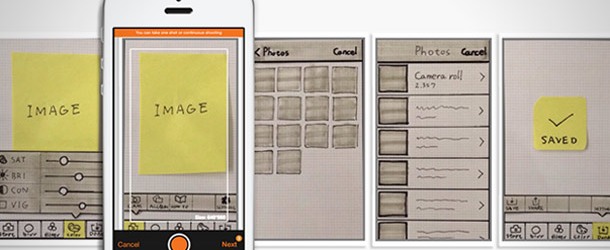
You cannot build a mobile app in isolation using just the native developer kit. Building an app requires that you have the right tools to deliver efficiently on every aspect of its life cycle.
Developing your first app can be a daunting experience, especially when you do not have enough knowledge of the tools available. Adopting these third-party tools will help you get to market quickly so that you can focus on getting the product/market fit for your app.
Prototyping
Prototyping your app gives you clarity on its every aspect, feature and the user flow. You need to have this bit sorted even before you approach a developer for building the application. The more clarity you have on your requirements, the more precise your timeline and pricing estimate for development.
1. Proto.io lets you create a full mobile-app experience without coding. What you get is a complete user flow and navigation of your app with interactive elements such as gestures and touch events to make it interactive.
2. InVision is another tool that allows you to create a fully interactive app prototype. The free tool also allows you to interact with your team members through a collaborative framework.
3. POP helps entrepreneurs, designers or even students to transform their pen and paper ideas into a prototype. If you started by sketching on a notepad, simply import it into this app by taking a picture.
Alpha/Beta Testing
The only way to know if something is working in your app is to test and measure it. You need to keep testing until you reach the desired result.
4. Amazon A/B Testing: Amazon has a free scalable tool for creating and running in-app experiments. Check out Air Patriots’ case study on how it improved its retention using the Amazon tool.
5. Heatmaps highlights the hottest areas on your mobile app, letting you track gestures, device orientation, user flows (navigation) and engagement.
6. Testdroid enables your development to be truly agile. It helps you test your application across different Android devices with different screen sizes, resolutions and different OS versions. Continuous Testing on real mobile devices saves up to 60% budget for mobile app development-testing cycle.
Mobile Backend
If your app requires users to sign up to use or any data is stored externally, then you need to build a backend. This means additional costs as well as signing up with a hosting provider. Early-stage mobile-app startups now have the option of using a third-party mobile-backend-as-a-service (MBaaS) provider to minimize those costs and develop quickly.
7. Parse was recently bought by Facebook. One of the most popular apps using Parse is Instagram. It gives you a great deal of flexibility along with a very easy to use iOS and Android developer kit that automatically takes care of synchronizing your app’s data with its cloud database.
8. Kinvey excels in the third-party integration provided through the platform. With Kinvey, you can pull rich video content from Brightcove’s App Cloud.
9. Xamarin has an impressive set of clients such as Rdio and MarketWatch using its backend. It’s helpful if you’re building native iOS or Android apps in C#.
Analytics
Analytics allow you to analyze user behavior in your app to get insights into what features are being used and which parts are driving conversions. They are also helpful in building an efficient marketing strategy.
10. Flurry (by Yahoo!) is a free tool that gives you insights into your users and app performance. You can track every menu tap, understand the user path, create funnels to optimize conversions and create user segmentations.
Marketing
Most often, the mistake that most entrepreneurs make is to think about marketing only after their product is live in the app store. You should start marketing the day you put your app into production.
11. Hello Bar is the simplest way to drive visitors to your highest-converting landing pages. It also helps you collect more emails and get more social shares.
12. FameBit connects you to YouTube influencers to create content that is shared a huge network. It’s fantastic for startups as videos start at $100.
Which tools do you recommend? Tell me in the comments section below.
(Original Arcticle: http://www.entrepreneur.com/article/237242)


